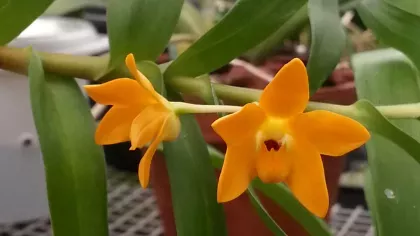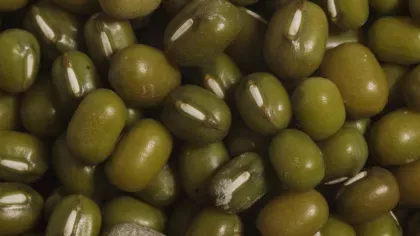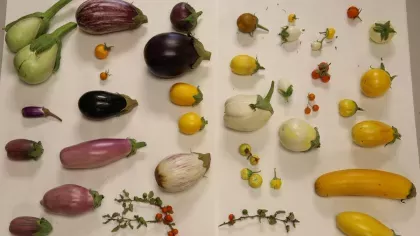4 January 2021
Sticking to its roots: taking action to save the sweet potato’s name
A change to sweet potato's scientific name would be very costly to the food industry.

Sweet potato is facing the threat of a change to its scientific name, Ipomoea batatas, which would cause a huge amount of disruption and cost to the food industry.
That’s why myself and 40 other scientists from around the world are taking action to preserve its name.

The sweet tasting starchy root vegetable is part of the iconic genus Ipomoea in the Convolvulaceae family.
The genus contains around 900 species, including many ornamentals such as morning glories, famous for their trumpet shaped flowers.
These related species are considered the crop’s wild cousins and are crucial for understanding important survival traits of sweet potato, and for identifying potential new crops that could be more suited to a changing climate.
Nine species of Ipomoea related to cultivated sweet potato (I. batatas), including I. triloba from Brazil, were targeted for seed collection as part of the recently finished Adapting Agriculture to Climate Change (Crop Wild Relatives) Project.
Mostly cultivated in the Caribbean, Sub-Saharan Africa, and East and Southeast Asia, sweet potato is the world’s seventh most important food crop, so it is crucial for global food security.
Crop breeders are seeking to exploit the genetic diversity of sweet potato wild relatives to make the crop more drought tolerant and resistant to diseases.


What’s in a name?
Ipomoea has a long history of scientific name problems.
Since the 1970s, the species that is used to define the genus Ipomoea (the ‘type species’) has been one very distantly related to the sweet potato.
While molecular biology has helped scientists to classify plants, studies show the genus should technically be split into several groups, resulting in many name changes, including that of the sweet potato.
Recent molecular biology studies by the University of Oxford have proposed a solution to this problem, by broadening Ipomoea to include both the closely and distantly related species to sweet potato.
However, alternative classifications may still be published in the future which would propose the splitting up of Ipomoea in several groups.
This could result in many name changes, including that of the sweet potato.
An unappealing situation
With over 90 million tonnes of sweet potatoes produced each year and hundreds, maybe even thousands, of registered cultivars, changing a name would be no easy, or cheap, task.
Numerous updates in legislation and health and safety guidelines as well as administrative, packaging and marketing updates for companies that directly commercialize these species, or any of its by-products, would be needed.

Keeping it sweet
Our proposed solution is to conserve a different ‘type species’ for Ipomoea, selecting a close relative of sweet potato.
This would secure the crop’s name while allowing the possible renaming of some groups of species that are not as closely related.
It’s difficult to communicate to governmental authorities, and the wider public, that a species called Ipomoea is not a cultivated or introduced plant.
For this reason, these species are often overlooked in conservation assessments and this could explain why, of the 900 species currently named Ipomoea, only 36 are on the IUCN Red List of threatened species.
We hope this move will bring attention to the threats on sweet potato’s most distant wild relatives, which currently suffer from being associated with the crop, and are seen as of less priority for conservation.
Read the paper
Eserman, L. et al. (2020). (2786) Proposal to change the conserved type of Ipomoea, nom. cons. (Convolvulaceae). Taxon 69: 1369–1371.
Acknowledgements
Thanks to Dr Lauren Eserman at the Atlanta Botanical Garden for co-leading this study with me, and the other 38 colleagues from a large range of institutions and countries of origin, for their support and enthusiastic collaboration; also, to Dr Iain Darbysire and Dr Christopher P Cockel for useful discussions and input.



